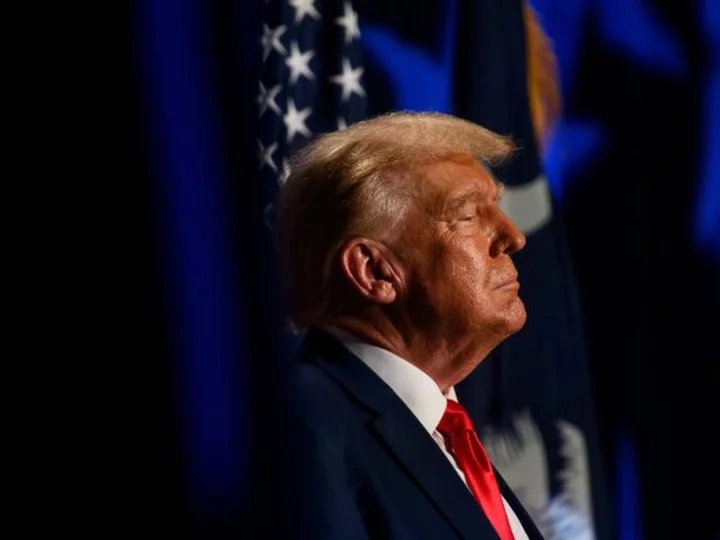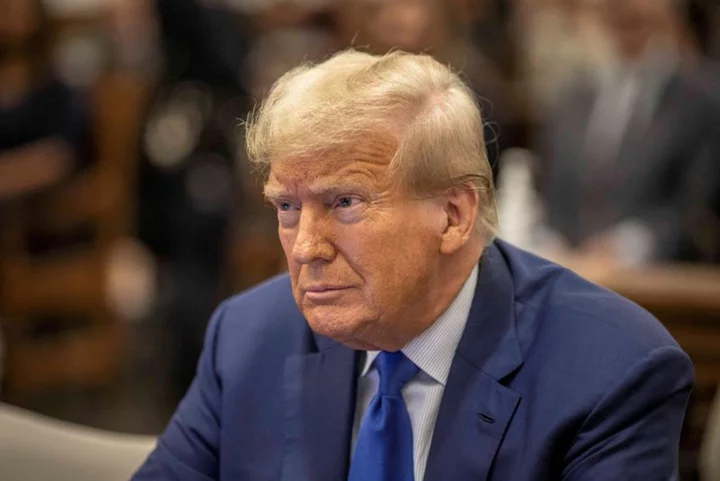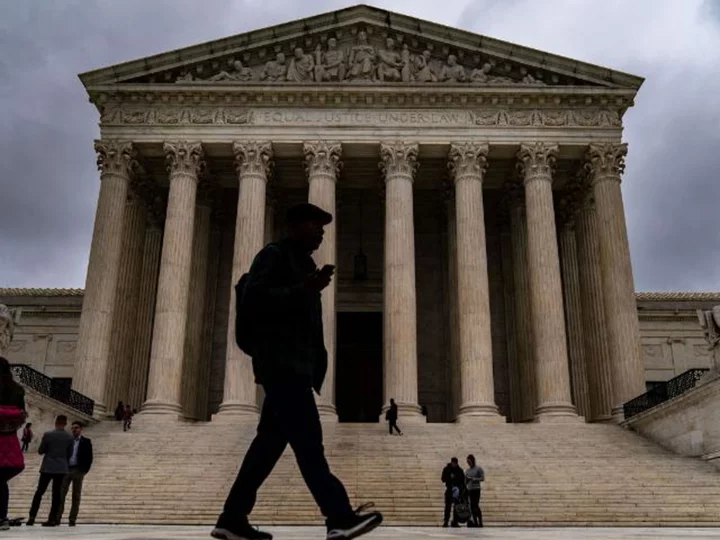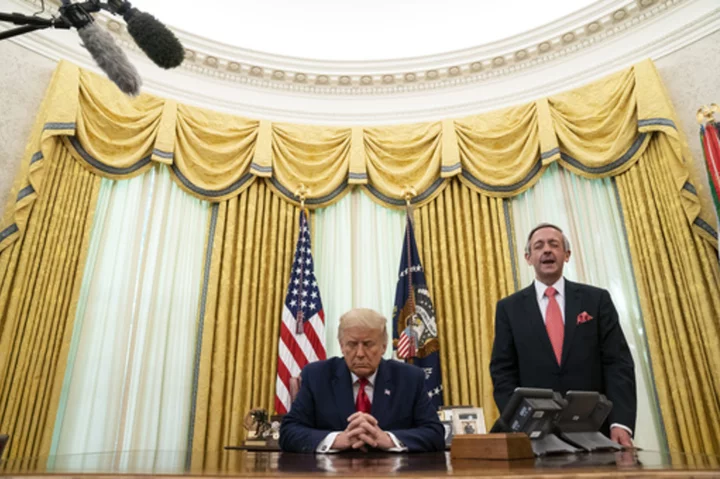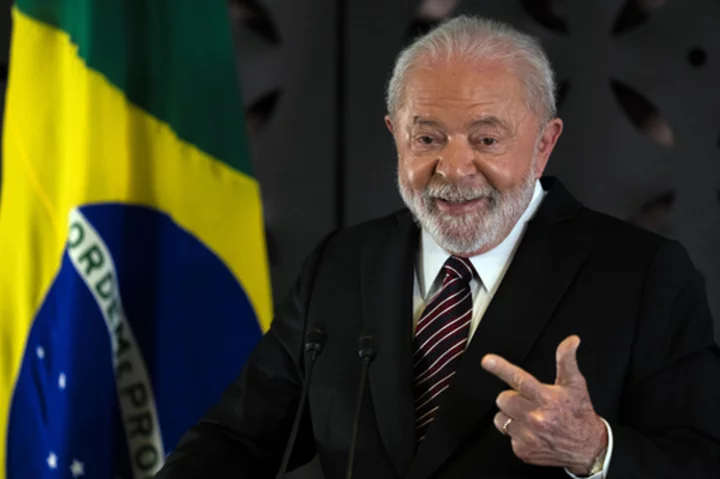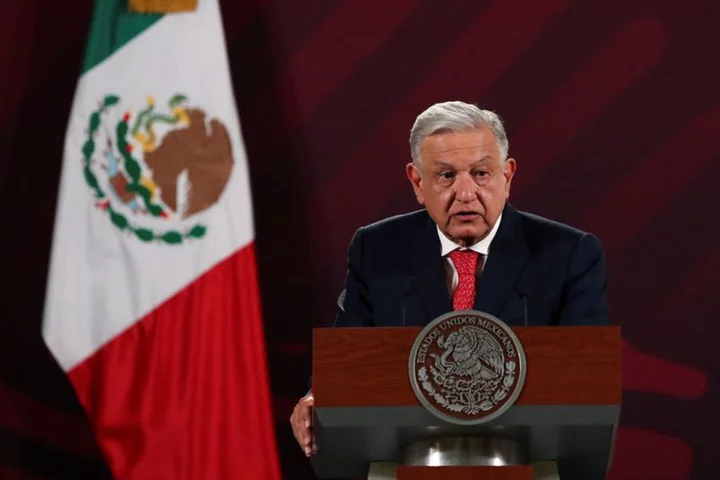The power of the presidency always lures those seeking reflected glory. And Donald Trump's riotous palace court -- renowned for lax Oval Office walk-in privileges -- was a pageant of characters who might normally have gotten nowhere near a president.
But the price for proximity to power in the most scandalous presidency of modern times came due just before midnight on Monday when 18 of Trump's former aides, officials, lawyers and associates were indicted alongside him over their efforts to subvert the 2020 election in Georgia. They were the latest members of the former president's inner circle to find out that associating with Trump could put them on cracking legal ice. At least until now, their patron has always seemed to skate free. But Trump is now staring up at his own astonishing mountain of 91 criminal charges in four separate indictments -- an unparalleled and dubious record for an ex-president.
The list of co-defendants in the Fulton County case includes Rudy Giuliani, the former New York City mayor who became a hero on September 11, 2001, for filling a national leadership vacuum amid the worst terror attack on the US in history. Giuliani -- who later served as Trump's attorney and political fixer, notably in events in Ukraine that led up to Trump's first impeachment -- is now ironically charged with violation of Georgia racketeering laws, the federal version of which he used as a high-powered and pioneering prosecutor who took down mafia dons and their networks in the 1980s. The man once known as "America's mayor" is also charged with multiple other counts including false statements and conspiracy to commit impersonating a public officer.
CNN reported Tuesday that Giuliani, who amplified Trump's false claims of fraud after the 2020 election in a series of bizarre and unhinged appearances, faces hundreds of thousands of dollars in legal fees -- a situation exacerbated by his involvement in several other cases and that has left him in financial difficulties, according to his lawyers. But the quintessential New York City bruiser insisted Tuesday, "I'm the same Rudy Giuliani that came after the mafia," defending his actions as those of an attorney legally representing his client. "I'm anxious to fight this case," he said on WABC radio. "We're going to beat these fascists into the ground."
Charged alongside Giuliani is former White House chief of staff Mark Meadows, a former member of the House Freedom Caucus from North Carolina, who was portrayed as a nexus of Trump's election meddling effort by the House select committee that investigated the January 6, 2021, mob attack on the US Capitol. Normally, the indictment of the top White House official, whose job was to be the gatekeeper to the president, would shake Washington to its core. But the capital has reverberated for months with historic criminal charges leveled against the president he was supposed to be protecting. Meadows on Tuesday filed to move his case from Fulton County, Georgia, to the federal system -- a step the former president is also expected to take soon. Convictions in the federal courts could open the way to pardons by Trump if he wins another White House term or by a Republican president -- a route that would not be open to him in state courts.
There is increasing speculation over why Meadows was charged in Georgia but not in special counsel Jack Smith's federal investigation into Trump's election stealing efforts. Legal experts wonder whether he could be cooperating with that probe in a sign of peril for the former president.
Other notable figures among those charged in Georgia include John Eastman, a former attorney for Trump who allegedly tried to convince then-Vice President Mike Pence that he had the power to interfere with the congressional certification of election results. Eastman's attorney, Harvey Silverglate, on Tuesday described the Fulton County indictment as a stunt to criminalize the advocacy of lawyers. "This is a legal cluster-bomb that leaves unexploded ordinances for lawyers to navigate in perpetuity," he said.
Sidney Powell -- who made unfounded claims of election fraud that even Trump acknowledged to others sounded "crazy," according to Smith's federal indictment -- was also charged. She faces racketeering and conspiracy charges.
All of the defendants, including Trump, are entitled to the presumption of innocence and none have yet entered pleas in the case. But all of them now potentially face months or years embroiled in what could be a highly complex case that will likely involve massive legal bills, extreme personal stress and potentially jail time if convicted -- a process that will make the days when they palled around with a president seem like another world. Trump has pleaded not guilty to three previous criminal indictments.
Trump's inner circles have long faced legal problems
Trump's co-defendants in the Georgia case are not the first to find out that the ex-president's intolerance for the rules and conventions that normally constrain presidencies can lead them into treacherous waters. Trump once vowed to bring only "the best people" to Washington, but his acolytes often find themselves dragged into his legal storms.
For example, two of Trump's other associates -- his personal aide Walt Nauta and Mar-a-Lago property manager Carlos De Oliveira -- have been sucked into the investigation over Trump's mishandling of national security documents. Both men have pleaded not guilty.
Some of those who flocked to Trump at the beginning of his involvement in presidential politics also got in trouble with the law, often not directly for acts taken in conjunction with him but after sometimes attracting the interest of authorities investigating other matters surrounding the then-president. Trump's former campaign chairman, Paul Manafort, was sentenced to 47 months in federal prison for defrauding banks and the government and for failing to pay taxes on millions of dollars in income earned from Ukrainian political consulting.
Former Trump national security adviser Michael Flynn pleaded guilty in 2017 to lying to the FBI about conversations with Russia's ambassador to Washington. Both men had been swept up in special counsel Robert Mueller's investigation into the 2016 Trump campaign's links to Russia.
Trump's former political guru, Steve Bannon, was sentenced to four months in jail last year for contempt of Congress after defying a subpoena to appear before the House January 6 committee. He has appealed his conviction. Bannon faces another trial in Manhattan next year in a fundraising fraud case. Prosecutors have accused Bannon and others of defrauding donors in a fundraising effort called "We Build the Wall." Bannon has pleaded not guilty to multiple counts of conspiracy, money laundering and scheme to fraud.
In yet another case involving a confidant of the ex-president, his long-time chief financial officer Allen Weisselberg was sentenced by a New York judge earlier this year to five months in jail for his role in a decade-long tax fraud scheme after testifying as the state's witness against the Trump Organization.
And in one of the most well-known cases of one of Trump's men tumbling into a legal pit, his former attorney and self-described fixer Michael Cohen served two years in jail and one year of home confinement after pleading guilty to nine federal crimes including tax fraud, lying to Congress and campaign finance violations for helping pay off two women who threatened to go public with past alleged affairs with Trump before the 2016 election. Unlike many of Trump's associates who got crosswise with the law, Cohen pointed the finger directly at his former boss, saying he facilitated the payoffs "in coordination with and at the direction of" Trump. The ex-president has denied the affairs but is due to go on trial in March after being indicted by Manhattan District Attorney Alvin Bragg in a case arising from a hush payment to former adult film actress Stormy Daniels.
One huge worry for Trump, given the large number of people indicted in the Georgia case, is whether some will cooperate with prosecutors in order to try to help themselves. In the past, Trump has been able to purchase the loyalty of business colleagues and used his pardon powers extravagantly as president. In one of his last acts as commander in chief, for instance, he pardoned Bannon on a previous federal fraud charge. He had earlier pardoned Flynn, Manafort and longtime ally Roger Stone.
Trump, now a private citizen, is no longer in a position to reward such loyalty among his inner circle, though he might be tempted to dangle pardon offers based on the possibility of him winning the presidency in 2024. But even if he is elected again, federal pardons won't help absolve associates caught up in the Georgia case, thanks to the founders' insistence on dividing power between the federal government and the states. Trump's leadership PAC, Save America, however, spent more than $40 million on legal fees for the ex-president and his associates during the first half of the year, sources told CNN last month.
The huge breadth of the Fulton County case brought by District Attorney Fani Willis -- who said Monday that she plans to try the 19 defendants together -- turns a spotlight on the extended cadre of allies who allegedly helped Trump in his bid to trash democracy. But with such a huge charging sheet, it could be months or longer until the case reaches court -- meaning that the 2024 election could be long gone before it reaches a jury.
Former Trump lawyer Ty Cobb told CNN's Erin Burnett on Tuesday that he wouldn't be surprised if it took Willis two years to bring the vast racketeering case to court.
"If it takes two years, heaven forbid that Trump wins the presidency, then there will be a fight to the Supreme Court over whether she can proceed against a sitting president during his term," Cobb said, noting that while federal prosecutors could not pursue a president during his term, the capacity of state prosecutors to do so had not been resolved.

